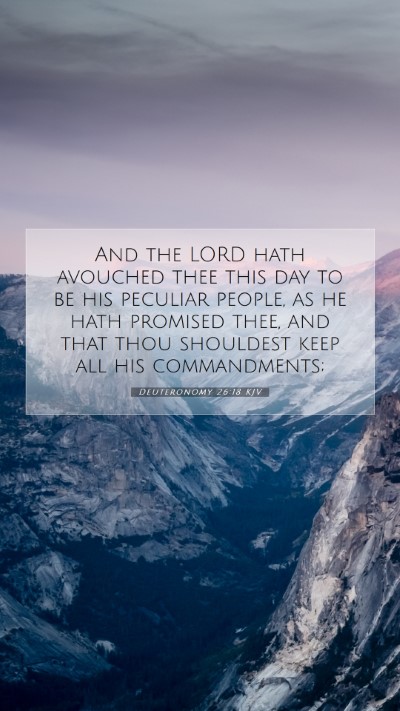Understanding Deuteronomy 26:18
Deuteronomy 26:18 states:
"And the Lord hath avouched thee this day to be his peculiar people, as he hath promised thee, and that thou shouldest keep all his commandments."
This verse encapsulates a significant moment in the covenant relationship between God and the people of Israel. It highlights both God's choice of Israel as His special possession and the reciprocal obligation of the people to adhere to His commandments. Below, we will delve into the Bible verse meanings, Bible verse interpretations, and Bible verse explanations gathered from respected public domain commentaries.
Verse Breakdown
-
Divine Election:
Matthew Henry emphasizes the phrase "hath avouched thee" as an act of divine declaration, marking Israel as a chosen nation. This selection is not based on merit but is a result of God's sovereign will and promise.
-
Peculiar People:
Albert Barnes adds that being a "peculiar people" signifies a distinct relationship that sets Israel apart from other nations. This notion of being chosen implies responsibility and a calling to live according to God's laws.
-
Promises and Obligations:
Adam Clarke points out that this covenant is reciprocal—God’s promise of protection and guidance hinges upon Israel's commitment to keep His commandments. The verse serves as a reminder of the nature of covenant relationship in the Scriptures.
Theological Insights
This verse provides deep Bible study insights into the nature of God’s relationship with His people. Here are several key themes:
-
Identity in God:
The concept of being a 'peculiar people' signifies that God identifies His followers uniquely. This brings about a sense of belonging and purpose (2 Corinthians 6:17).
-
Call to Holiness:
Following this type of divine selection calls for a life set apart for righteousness. Scripture encourages believers to live in a way that reflects their relationship with God (1 Peter 2:9).
-
The Nature of Covenantal Faith:
This verse emphasizes the importance of covenant faith, as God's promises are met with human obedience. This concept resurfaces throughout Scripture, illustrating how faith and works are intricately connected (James 2:26).
Application of the Verse
For individuals engaging in Bible study groups or online discussions, this verse provides rich material for reflection on personal and communal faith practices:
- Reflect on how the election of Israel as a peculiar people relates to the New Testament believers’ identity in Christ.
- Discuss practical applications of keeping God's commandments in modern daily life—how can we reflect our commitment?
- Consider the implications of divine selection—what does it mean for us to be chosen today?
Related Scriptures
To complement your understanding of Deuteronomy 26:18, consider the following related scriptures:
- Exodus 19:5-6: This passage reiterates the positioning of Israel as a holy nation.
- 1 Peter 2:9: It reflects the New Testament understanding of believers as a chosen generation.
- Malachi 3:17: God’s promise of protection for His own is clarified.
Conclusion
In conclusion, Deuteronomy 26:18 is pivotal for grasping the implications of God’s covenant with His people, illustrating profound Scripture analysis, Biblical exegesis, and offering insights into our responsibilities as God’s chosen. Understanding Scripture involves not merely knowing details but applying God’s message to everyday life, thus enriching our spiritual journey. Engage with this verse to deepen your Bible study lessons and enhance your understanding of God’s nature and expectations.


